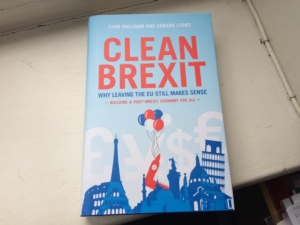Published on 27 October 2017
Delighted to have been included in the acknowledgments in this new book co-authored by Dr Gerard Lyons, chief economist for a series of leading banks, and Liam Halligan, columnist at the Sunday Telegraph.
 Specifically on p187-8 in the section “Tax and Spend”, they referenced my Brexit Papers 4 and 5 for Global Britain (http://brexitpapers.uk).
Specifically on p187-8 in the section “Tax and Spend”, they referenced my Brexit Papers 4 and 5 for Global Britain (http://brexitpapers.uk).
“According to fascinating research from Global Britain, MNCs have been taking advantage of, or legally abusing, the EU’s ‘freedom of establishment’. This is the corporate version of freedom of movement”.
“Smaller EU nations also use aggressive tax policies to attract MNCs, hosting European headquarters of such companies, creating local graduate jobs, payroll taxes and local spending. The MNCs, meanwhile, benefit from the tax advantages – whether it be accelerated depreciation, low corporation tax, specific local regimes or asymmetric treatment of revenues that can de derived from specific costs”.
The biggest culprits in this regard are Ireland, Luxembourg and, to a lesser extent, the Netherlands”.
“The UK Exchequer suffers… The sums involved are huge, with £10 billion lost annually”.
So far in the UK’s bargaining stance towards the EU, however, this issue has not even made the small print. Indeed, while it has been pretended that the Lancaster House speech and subsequent position-taking in the negotiations would guarantee that Brexit would deliver on 95% of what Brexiteers thought they were voting for, this seems now rather like a Christmas List with a hundred items on it, starting with…
- Holiday in Bermuda
- Flat in Knightsbridge
- BMW 7-series
- House extension
- £1,000 of John Lewis vouchers
- Keyring
- Cuddly toy
- etc…
And on Christmas Day you get:
- £1,000 of John Lewis vouchers
- Keyring
- Cuddly toy
- etc…
The four items with the highest Brexit tariffs are:
- cessation of any obligation to meet the Payment Appropriation of the Multiannual Financial Framework – meaning the UK’s cash payments to the EU budget and joint-and-several-liability for the payments of any and all other member states should they not be able to meet their obligations – £9 billion per annum;
- cessation of any obligation under the Commitments Appropriation of the Multiannual Financial Framework – meaning the UK’s contingent liability to pay in to the EU budget to meet the EU’s debts, in case – for example – Ireland and Portugal fail to make their payments under their bailout financing through the European Financial Stability Mechansim. The UK would be called upon to pay its pro-rata share. But on top of that the UK has joint-and-several-liability for the remainder, in case other member states are unable to meet the calls on them: if Ireland and Portugal had failed to meet their EFSM payments, it would be a certainty that they could not meet the resulting call to pay into the EU budget, and the UK’s call would escalate, potentially up to the entire amount of the Commitments Appropriation – up to EUR1.3 trillion;
- requiring the citizens of other EU member states who availed themselves of ‘freedom of movement’ whilst the UK was an EU member state to find work in and then move to an EU member state, the UK no longer being one – £30 billion per annum;
- replacing the current Single Market terms-of-trade with an arrangement whereby the UK’s HMRC is allowed to “look through” whatever construction MNCs have on paper through EU member states and levy a bill for corporation tax and PAYE income tax and national insurance as if the business model had been fully onshore – £12 billion per annum.
Delivering on these high-tariff items and as from March 2019 should be the government’s priority, and if that means no tariff-free trade with the EU so be it. That is what Brexit means to the 17.4 million people who voted for it. So far the UK government’s position has been to give away (3) completely, pay (1) until the end of December 2020 (when the Multiannual Financial Framework expires), and not even to mention (2) and (4).
